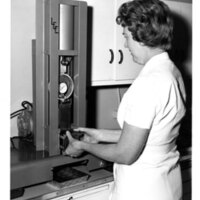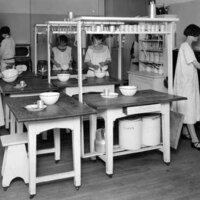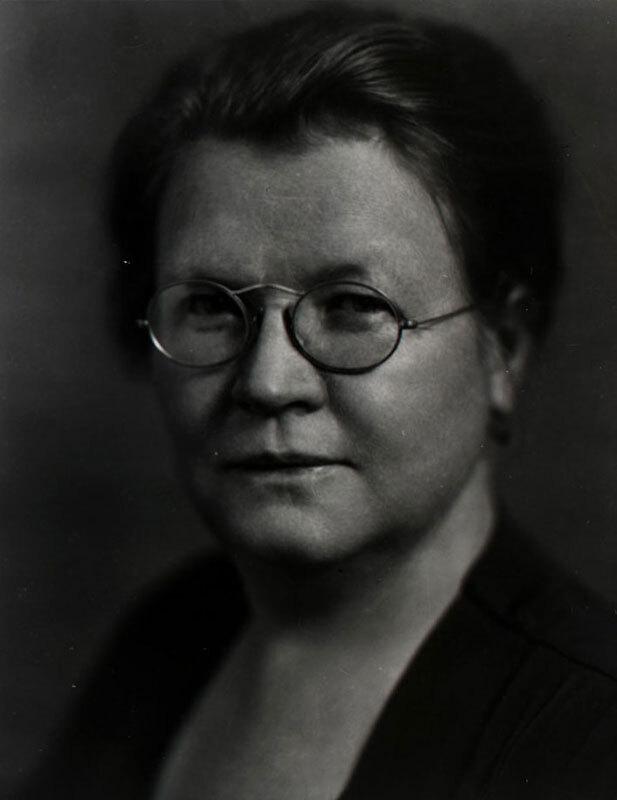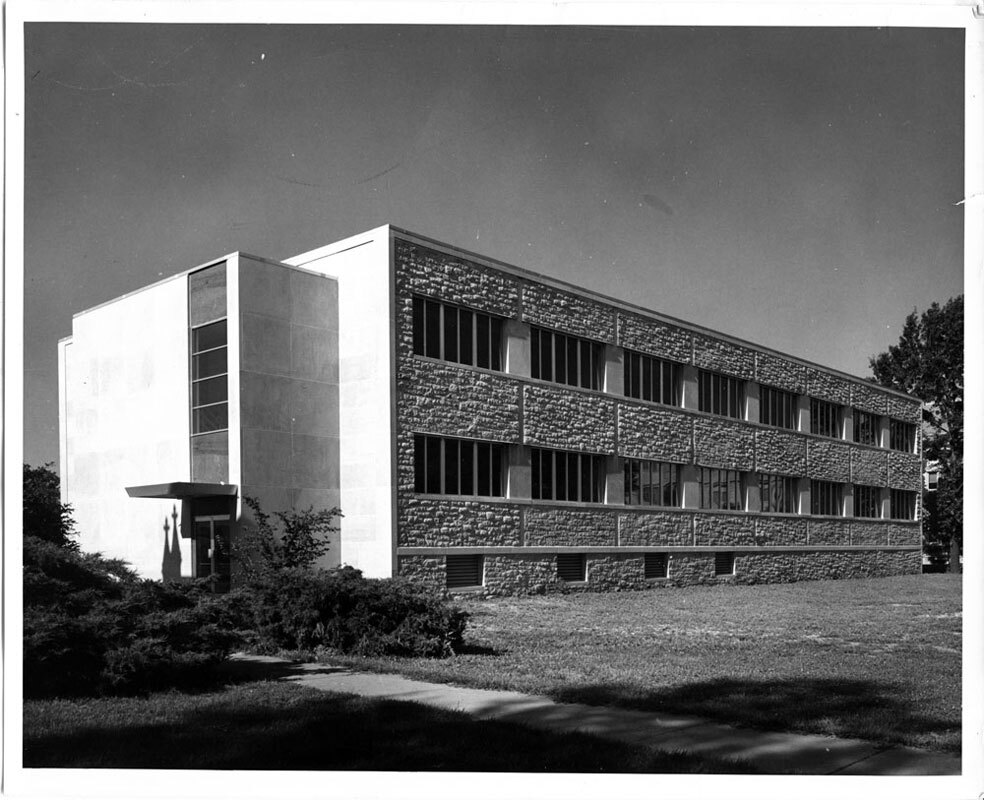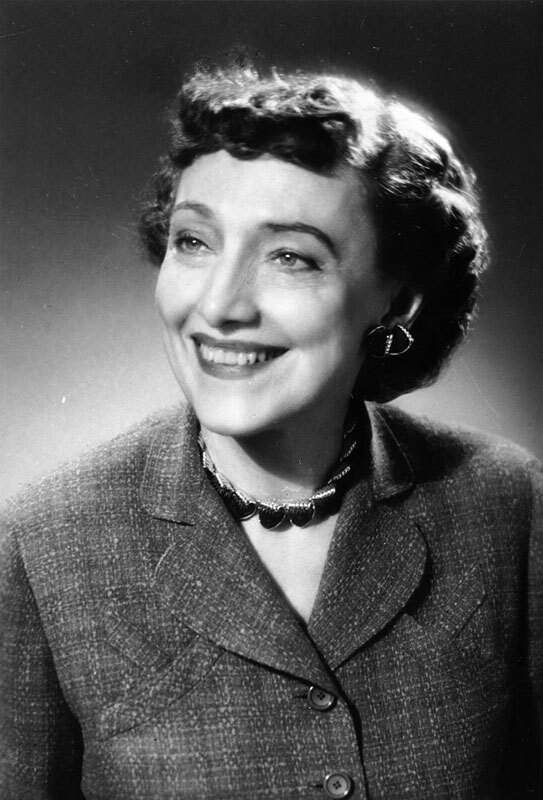Food Revolutions: Science and Nutrition, 1700-1950
Early Nutritionists at Mizzou
Food science and nutrition courses have been a part of University's curricula since 1902, when courses in food and dietetics were offered for the first time.
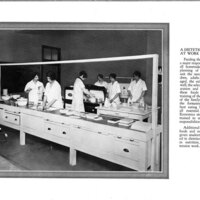
A dietetics class at work planning and preparing meals to meet the nutritional needs of the family group.
College of Agriculture view book, circa 1920s.
University Archives.
Louise Stanley
Louise Stanley was appointed Instructor of Home Economics at the University of Missouri, in 1907, after completing a Master of Arts at Columbia University. In 1911, Stanley completed her Ph.D. at Yale University and became Professor and Chair of Home Economics at the University of Missouri that same year. She first began working with the U.S. Department of Agriculture (USDA) in 1914 as a special agent in the Office of Experiment Stations conducting a survey of home economics instruction.
Stanley left the University in 1923 when U.S. Secretary of Agriculture Henry C. Wallace appointed her as chief of the newly established Bureau of Home Economics. It was during the later 1920s and early 1930s that Stanley conducted some of her most important studies on the proper nutritional elements of the human diet. Data supplied by the Bureau led to the launch of a national campaign by the USDA to improve American diets.
The scope of Stanley's research expanded in 1943 when she was appointed as Special Assistant to the Administrator of the Agricultural Research Administration. There her research extended to the study of diets throughout the world, but most extensively in Latin America, where she worked to improve diets with the introduction of new foods and improved processing and distribution methods.
Louise Stanley's contributions were recognized by the University of Missouri both before and after her death in 1954. In 1940, she became the first woman to receive an Honorary Doctorate (LL.D.), and in 1961, a new building constructed for the School of Home Economics was named in her honor.
Stanley Hall
Stanley Hall circa 1963. Home Economics had become a school within the College of Agriculture three years earlier. In 1973, the school became the independent College of Home Economics and the name was changed to the College of Human Environmental Sciences in 1988. Stanley Hall is currently home to Architectural Studies, Textile and Appeal Management and the Child Development Lab.
Jessie Alice Cline, 1891-1996
Jessie Alice Cline had completed both a Bachelor of Science (1915) and a Bachelor of Arts (1916) degree at the University of Missouri prior to accepting a position as instructor in Home Economics in 1921. Cline was promoted to assistant professor in 1923, completed a Master of Arts in 1925, and was promoted to associate professor and chair of the department that same year. Cline became full professor in 1930, a position she held until 1940, when she resigned to accept the appointment of Director of Home Economics for the National Live Stock and Meat Board in Chicago.
While at the University, Cline had also worked with the U.S. Department of Agriculture, spending the summer of 1938 in Italy to study the management, methods and techniques of food preparation in hotels and restaurants. Her specialty was meat cookery and the conservation of meat nutrients by use of low temperature cooking. Cline wrote meat cookery manuals for the U.S. Army and Navy, and worked with large restaurants and hotels throughout the country during World War II, to assist them in conserving meat. At various times Cline owned restaurants in Columbia, Chicago and Kansas City, served as a director for the National Restaurant Association, as Food Editor for American Restaurant, and as president of the Missouri Restaurant Association.
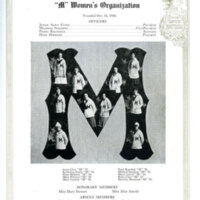
Savitar, 1917 p.283
LH1 .S2
University Archives C:22/1/1
A page from the 1917 yearbook featuring the University of Missouri's "M" Women. Jessie Alice Cline is in the photo along with her younger sister Ruby. Ruby received a Bachelor of Science in Education from the University in 1918 and was hired as a teaching supervisor by the University in 1920. She remained at the University teaching physical education for the rest of her career. In 1967, Ruby became Professor Emeritus of Physical Education and retired the following year.
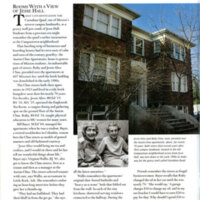
MIZZOU, Fall 2003
Photos by Rob Hill
LH1.M63 A5
This alumni magazine article on the Cline sisters features a photo of the Austin-Cline Apartments that the sisters owned and operated for many years. Jessie Cline's Enlgenook Tea Room, a popular campus dining and gathering spot occupied the ground floor. The building was at 607 Missouri Avenue, across the street from Hulston Hall, on what is now the University's Mel Carnahan Quadrangle (South Quad).
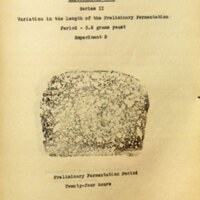
Jessie Alice Cline ( 1891-1996)
The use of dried yeast in making light bread from Missouri soft wheat flour
Master of Arts Thesis
University of Missouri, 1925
378.7M71 XC615
In her 1925 master’s thesis, Jessie Alice Cline addressed “the problem of lack of information available to enable housewives to use soft wheat flour with a cheaper form of yeast which keeps indefinitely, to produce good bread.” Cline argued that while more difficult than baking with hard wheat flour, it was possible to make bread from soft wheat flour with improved “shape, oven spring, volume and texture.”
At the time Missouri ranked first in states producing soft winter wheat. Most of the wheat however, was being exported, while hard winter wheat was being imported to Missouri for bread making. Cline predicted a shortage of hard wheat and wanted to find a way to utilize locally grown wheat as a substitute. If successful, Cline expected Missouri flour mills to benefit from this transition and the price of bread to go down, as a result of reduced transportation costs. The research centers around conserving the use of expensive yeast by experimenting with the fermentation and proofing periods to achieve the desired results.
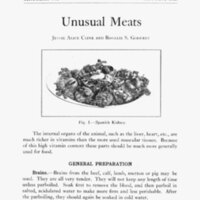
Jessie Alice Cline (1891-1996) and Rosalie S. Godfrey (1895-1966)
Unusual meats
Circular 162
University of Missouri, Agricultural Experiment Station, 1927
University Archives, Collection C:5/11/2
Cline and Godfrey collaborated on this circular to provide information on the use of various internal organ meats. The circular places emphasis on special methods of preparation since most of these meats spoil faster than commonly used muscular tissues. The circular also provides a variety of recipes for the brain, tongue, kidney, heart, liver, thymus glands and the feet of cattle, hogs and sheep. Godfrey held a research position with the University of Missouri at the time of this publication but left for the University of Texas shortly after, where she was Associate Professor Emeritus of Home Economics at the time of her death.
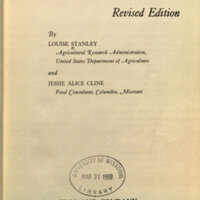
Louise Stanley (1883-1954) and Jessie Alice Cline (1891-1996)
Foods: their selection and preparation (Revised Edition)
Ginn and Company, Boston 1950
641 St25f 1950
Stanley and Cline first collaborated on this textbook in 1935, and for the 1950 revised edition displayed here. The book was primarily written for college and university students beginning the study of the selection, preparation, and serving of food. The authors relied upon their vast experience working in laboratories, experimental kitchens, government agencies, and the food industry, combining their knowledge of the rapidly evolving science of nutrition and the art of creating palatable meals, with the economic considerations of buying, storing, processing and preparing food.
